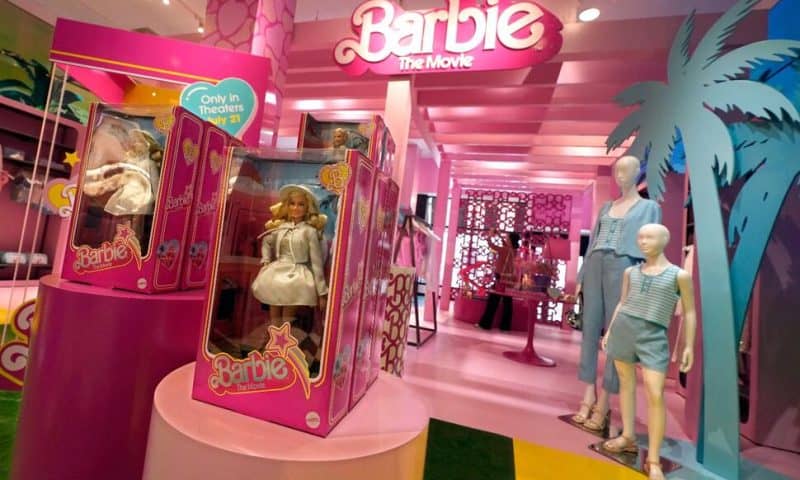The “Barbie” movie created magic at the box office, but the iconic doll’s parent Mattel is bracing for it to make a big difference in the toy aisles
NEW YORK — The “Barbie” blockbuster movie created magic at the box office, but the iconic doll’s parent Mattel is bracing for it to make a big difference in the toy aisles.
Mattel Inc. on Wednesday turned in a surprise profit and better sales during the second quarter than analysts expected. But worldwide sales of Barbie to retailers excluding adjustments fell 6% in the quarter ended June 30 as promotions were shifted to align with last weekend’s release of the iconic doll’s first live action picture. Mattel executives told analysts during an earnings call following the release that sales have improved in July, and it expects the movie will have a halo effect on the brand for years to come.
The film — which set an opening weekend record last week for the year — splashed worldwide attention on the doll and boosted shares of the company in the past month. Ahead of the opening, Mattel created a product marketing blitz with more than 100 brands plastering pink everywhere. But it won’t likely see the full benefits of the tie-ins for awhile — and consumers are still spending cautiously on toys.
“We significantly increased free cash flow and continued to gain market share,” said Ynon Kreiz, chairman and CEO of Mattel in a statement. “Importantly, this moment will be remembered as a key milestone in our company’s history with the release of the Barbie movie.”
The movie release comes also at a time when Kreiz, who came to Mattel’s helm in 2018, is turning the toy company into an intellectual property house, with “Barbie” the first of 14 live action movies planned with major studios.
The company made $27.2 million, or 8 cents per share, in the quarter ended June 30. That compares with net income of $66.4 million, or 18 cents per share, in the year-ago period.
Sales fell 12% to $1.09 billion from $1.23 billion in the year-ago quarter as retailers trimmed orders for toys amid economic uncertainty.
Analysts were expecting a loss of 3 cents-a-share on sales of $1 billion.
Anthony DiSilvestro, chief financial officer of Mattel, noted that the “retail inventory correction” is behind it.
Net sales and gross billings in the North America segment decreased 18% during the second quarter. Gross billings is a metric that reflects sales to retailers before adjustments.
For the second quarter, worldwide gross billings for the doll category was $441 million, up 10% as reported, or 9% in constant currency, versus the prior year, primarily driven by Disney Princess and Disney Frozen, and Monster High, partially offset by a decline in Barbie.
Mattel reiterated its financial outlook despite a surprise profit in the quarter.
Mattel stuck to its full-year outlook, which it projects to be flat from last year, and adjusted profit per share between $1.10 and $1.20 per share.
Shares slipped 2% in after market trading on Wednesday after adding 15 cents to $21.32 per share.
“While the Barbie blockbuster didn’t happen in Mattel’s Q2, its takeover of pop culture shows the huge potential its IP has, “ said Insider Intelligence Principal Analyst Jeremy Goldman in a statement. ”It also speaks to Mattel’s ability to work with key Hollywood players to bring its properties to life in a media-savvy manner. “

